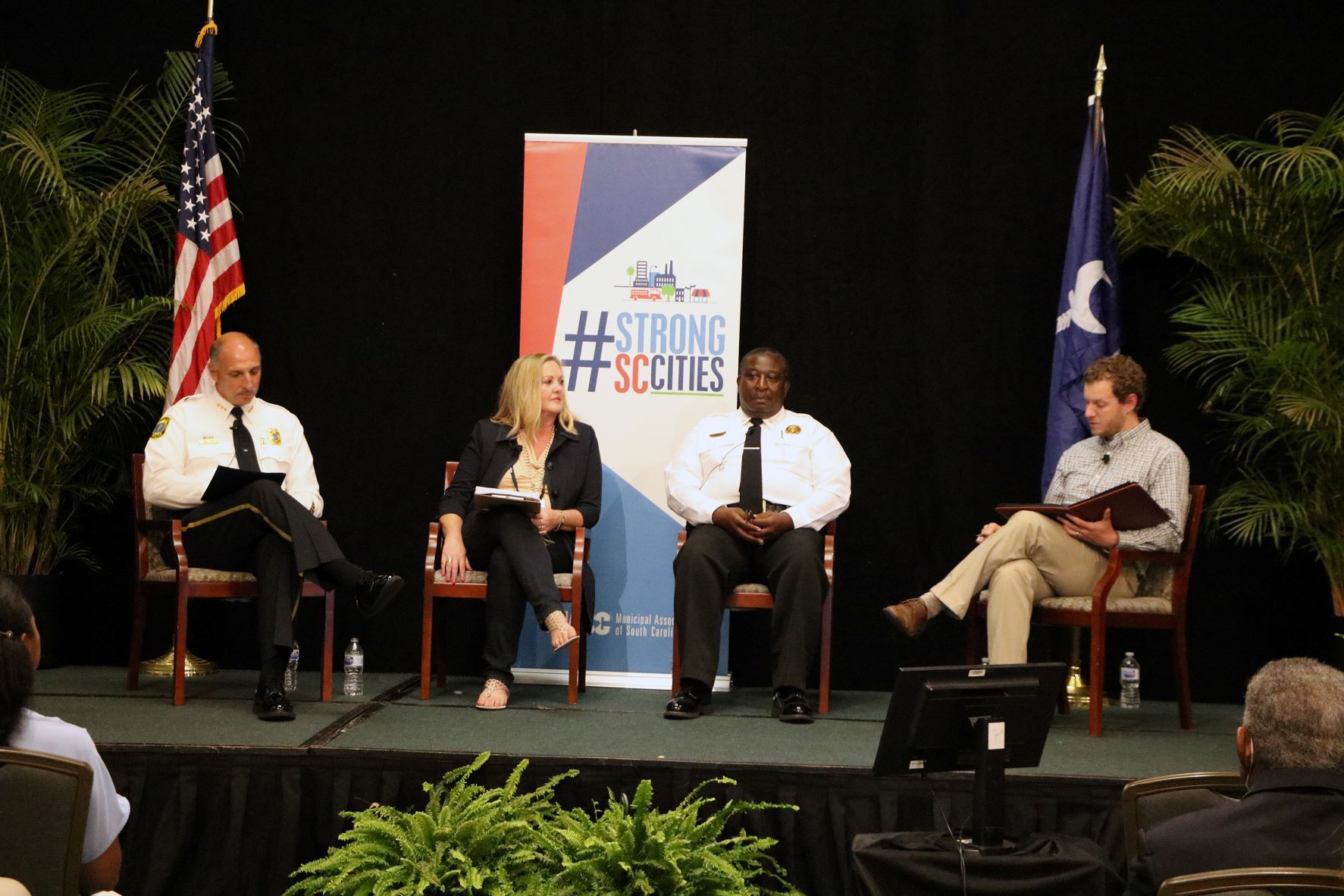The law enforcement and communication officials who joined a panel on building trust between residents and police during the Municipal Association’s Annual Meeting had several takeaways for their audience — never cover up bad news, keep a crisis communication plan ready and get everyone involved in communication training.
Debbie Szpanka serves as the public information officer for the Town of Bluffton. She likened her breaking-news communication approach to handling difficult incidents in private life.
“If you’re ever stuck, you then ask yourself, will this work with my spouse? Will this work with my child? With my best friend? And if it won’t, it won’t work with the community and it won’t work with the media,” she said.

From left: Columbia Police Chief Skip Holbrook, Bluffton Public Information Officer Debbie Szpanka, Williamston Police Chief Tony Taylor and North Charleston Public Relations and
Deputy Economic Development Coordinator Ryan Johnson.
This can help the communicator understand, she said, that a “no comment” response would be like refusing to talk about something in a personal relationship, which escalates the emotions involved. Szpanka added that understanding what an audience needs to know about a situation is critical to preventing problems.
In a severe weather situation, she said, residents “don’t need to know that 35 trees are down. They need to know what roads they’re down on. They don’t need to know that ‘the storm wasn’t so bad, we only had 500 outages.’ Where are the outages? Can I go to work? Can I go grocery shopping?”
Town of Williamston Police Chief Tony Taylor advocated for public information officer training for police chiefs, elected officials and managers, and to prepare for emergencies with an agreed-upon contact for each type of incident.
“Things happen in small agencies and small towns as well as in the big cities,” he said. “It’s important that you prepare by educating your chiefs and getting people within that agency the proper training.”
City of Columbia Police Chief Skip Holbrook spoke of the importance of handling breaking-news messaging in a timely fashion, since “we all know bad news doesn’t get better with time.”
The panel moderator, Ryan Johnson, who handles economic development and public information for the City of North Charleston, echoed that sentiment, advocating for the timely release of public documents.
“It’s better to go and get everything out at once,” he said. “Let the media have it and then deal with it accordingly.”
Holbrook said that staying involved in community narratives about police work can be challenging, especially after the unrest and protests that followed the killing of George Floyd in Minneapolis in May 2020. He spoke of the importance of distributing accurate information. He pointed to the questions over whether his department would ban chokeholds of suspects, given the use of a chokehold in Floyd’s death.
“We have never trained to choke people, and we had to demonstrate that through policy, through actions,” he said.
The panel described ways to be proactive with messaging. Holbrook noted that officer body cameras have become an expectation and have “lowered the temperature in the room,” in terms of providing documentation of what happens in police encounters. The Williamston Police Department uses its Facebook page to describe its work and includes videos of Taylor addressing residents.
Szpanka cautioned that social media users must remember that it “is a tool, not an obsession or lifestyle.” But she noted its value for the Town of Bluffton when Hurricane Matthew came in 2016. The lack of significant storms in previous years meant that some residents were unfamiliar with what to do or where to get information during a hurricane. Mayor Lisa Sulka went out several times a day in a rain jacket to shoot live hurricane update videos that were posted on the town’s Facebook page.
“I think it was one of our most famous moments,” Szpanka said, “because people were incredibly grateful for that real-time information.”
Find presentation material and recordings for the Annual Meeting online.
